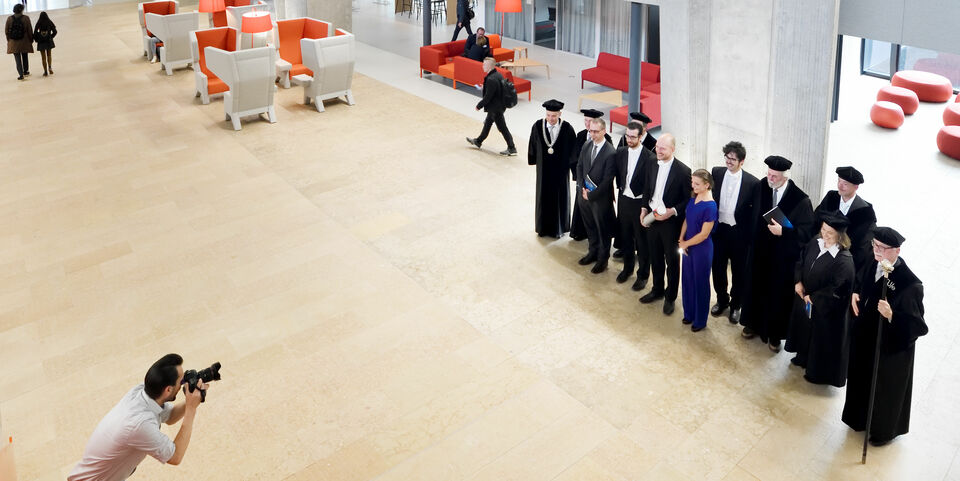“Hora Finita will be beneficial to PhD students, supervisors and TU/e”
One of the things Paul Koenraad, dean of TU/e’s Graduate School, hopes to achieve with online tracking and registration system Hora Finita, is to reduce the number of late drop outs - about forty a year - among PhD students. “Nothing is sadder than when someone still decides to quit after four years,” Koenraad says. The system, which goes online today, will significantly improve the information provision on TU/e’s 1600 PhD students, he says. The entire institution will benefit from this, according the dean. PhD students and their supervisors will have better insight into the PhD process.
“No, TU/e still performs well nationwide when it comes to the average speed with which PhD students obtain their doctorate degrees,” Koenraad says. “That average is around 4.5 years. This is not the reason why we launch Hora Finita today. But we didn’t have a system until now that registers our PhD students on a central level and provides insight into their progress. We collect information about this annually for the overviews of the VSNU, but the implementation of Hora Finita will allow us to do this centrally and detailed. We also want to better identify the large number of bursary, not-on-payroll PhD students at TU/e. They often still aren’t on the radar.”
Go/no-go decision
Koenraad says that not all the system’s functionalities will become operational immediately today. “We start with registration and everything that needs to be done to complete the PhD process. Next academic year, we will introduce the third important functionality: tracking PhD students during their PhD process.”
This part will encompass matters such as a supervision and education plan, a go/no-go decision after the first nine months, annual appraisal interviews, and a final evaluation. Koenraad: “This has to prevent PhD students and/or their supervisors from abandoning the PhD process later on, sometimes well into the fourth year even. Very sad for the students in question, but disadvantageous to supervisors, the research group and the department as well; to the entire institution basically. We’re talking about approximately forty PhD students who decide each year not to continue with their PhD process. It would be great if we managed to convince these people much earlier on not to continue.”
Koenraad says that he himself is already very actively working on this for his own PhD students. “They have to write a piece after nine months about the research they’re working on, and they need to describe how they plan to continue with it. Based on that, they then give a thirty-minute presentation, which is attended by external experts as well, to ensure that the assessment will be unbiased.” Koenraad immediately adds that he is by no means the only one at TU/e who works like this, “but by launching Hora Finita, we want to implement this university wide.”
Administrative procedures
What will be very important from day one, Koenraad says, is convincing all those involved that the administrative procedures that come with Hora Finita are worthwhile. “Our scientists had to perform an ever-increasing number of digital, administrative procedures in recent years, which they believe are at the expense of research,” he says. “This is another such procedure, they’ll say, therefore we need to convince them of the benefits.”
As an example, he cites an analysis that was made at the department of Electrical Engineering in the context of a research assessment. “This provided the leaders of research groups at EE with insight into how long PhD students at different groups took to obtain their doctorate degrees. It turned out that students were much faster in certain groups, so it was decided to sit down together to find out why that was the case, and whether everyone could benefit from it. That’s what I mean when I say that the entire institution will benefit from it.”
Sharpening
Both the department of Electrical Engineering and Mathematics and Computer Science have been running a pilot with Hora Finita for some months. Koenraad says that both testcases, in part thanks to the efforts made by Information Management & Services (IMS) and Education & Students Affairs (ESA), have led to a sharpening of the system. “Hora Finita is used by six other Dutch universities at this point, but each institution makes it best suited to its own needs. For example, each university has its own systems with which it needs to be made compatible. There’s also a national user group that convenes several times a year to discuss problems and solutions. We have tried to make it as user-friendly as possible for our university.”
Koenraad will be very happy when it turns out after some time that the number of late drop outs has reduced significantly. “It always hurts a supervisor when someone decides not to continue, or when a student is told that it would be better not to go on with the PhD process. Irrespective of the reason, or the phase of the process during which this happens.”


Discussion